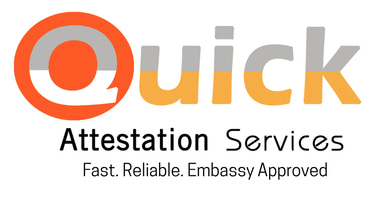Essential Documents for Qatar Embassy Attestation 2025
Discover the essential documents required for Qatar embassy attestation in 2025. Ensure you meet all Qatar embassy requirements and streamline your attestation process with our comprehensive guide.
9/5/20257 min read


Introduction to Qatar Embassy Attestation
Embassy attestation is a crucial process that involves the verification and authentication of documents by an embassy or consulate. In the context of Qatar, this procedure is vital for individuals and businesses engaging in various legal and administrative matters within the country. Embassy attestation is not merely a formality; rather, it serves to ensure that the documents are genuine and adhere to the legal standards required by the Qatari government. This process plays an essential role in the immigration, business, and educational sectors, thereby facilitating smoother interactions with Qatari authorities.
For individuals, embassy attestation is often necessary for documents like birth certificates, marriage certificates, and educational credentials, especially for those looking to relocate, establish residency, or pursue education in Qatar. Businesses operating in or collaborating with Qatari companies must also authenticate documents such as contracts, agreements, and company registrations. This attestation lends credibility to these documents, thereby ensuring legal recognition in Qatar. The process can be complex and time-consuming, often involving multiple verification steps, but it is ultimately critical for legal compliance and administrative efficiency.
In light of the increasing globalization and the growing number of international interactions, understanding the embassy attestation process is paramount. Not only does it streamlines the recognition of foreign documents, but it also minimizes potential legal disputes that may arise due to unverified documentation. Therefore, being well-informed about the requirements and steps involved in Qatar embassy attestation is essential for anyone planning to conduct business or reside in the country. Ensuring that documents are attested by the Qatari embassy can pave the way for smoother transitions in legal and administrative matters.
Significance of Document Attestation
Document attestation serves a crucial legal function in the realm of international documentation. It is the process through which a government authority verifies the authenticity of a document, ensuring its validity for use in various administrative and legal contexts. The significance of document attestation cannot be overstated, particularly when it pertains to employment, education, and business transactions. In today’s globalized world, the demand for legitimate documentation has surged, necessitating attestation to avoid potential complications.
Attestation is often required for various scenarios, including but not limited to, employment contracts, educational certificates, and commercial agreements. For instance, prospective employees looking to work abroad must frequently present documents verifying their qualifications and experiences. These documents must be attested to signify that they are legitimate and recognized within the employing country. Similarly, educational institutions may require attested degrees to confirm a candidate's educational background, ensuring that the information presented is credible. Furthermore, in business dealings, attested documents are essential for establishing trust and credibility among partners and stakeholders, thereby facilitating smoother operations.
However, failing to have documents attested can lead to significant repercussions. Without attestation, documents may be considered invalid or become susceptible to challenges regarding their authenticity, potentially jeopardizing job offers, admission into educational institutions, or the legitimacy of business contracts. Moreover, the lack of verified documentation can result in legal disputes, financial losses, and damage to one’s reputation. Thus, understanding the significance of document attestation is imperative for individuals and businesses alike, as it not only bolsters the reliability of their documents but also enhances their global engagement and prospects.
List of Required Documents for Attestation
When seeking attestation from the Qatar embassy in 2025, it is crucial to prepare the required documents meticulously, as they may vary depending on the purpose of the attestation. Below is a categorized list of essential documents you will need for personal, educational, and commercial purposes.
For personal document attestation, individuals should typically provide: a valid passport, a photocopy of the passport, and the original document requiring attestation, such as a marriage certificate or birth certificate. Additionally, some nationalities may need to present a certificate of no objection or a similar document, particularly if the attestation is related to legal matters.
In the case of educational document attestation, applicants must gather documents such as the original degree certificate, transcripts, and proof of prior education. Nationality may affect requirements, so individuals from specific countries might also be requested to provide equivalency certificates or additional governmental approvals.
When it comes to commercial document attestation, the required documents typically include the original commercial contract, partnership agreement, or memorandum of association, along with business registration documents and tax identification numbers. Foreign companies may also need to submit additional documents that authenticate the legitimacy of their foreign status and business operations.
It is essential to check with the specific embassy or consulate to confirm any additional requirements or variations based on individual scenarios and nationality. This ensures that all required documentation is complete and up to date, minimizing potential delays in the attestation process.
Steps to Prepare Documents for Attestation
Preparing documents for Qatar embassy attestation requires careful attention to detail and adherence to specific procedural steps. The first crucial step is to ensure all documents requiring attestation are notarized by a certified notary public. Notarization serves as a legal validation of the authenticity of signatures and the legitimacy of the documents. It is advisable to consult with a reputable notary who is familiar with the attestation process, particularly with documentation intended for use internationally.
Subsequently, documents must be verified by the relevant authorities. For educational certificates, this typically involves obtaining a verification from the educational institution and subsequently from the Ministry of Education or equivalent body in the country of issuance. For business-related documents, a verification from the relevant business or trade entities and government authorities is required. This step ensures that the documents possess credibility and are accepted by the Qatar embassy.
It is also essential to format and organize all documents accurately. Ensure that each document is structured according to the embassy’s guidelines, which may include specific formatting requirements such as document size, type of paper, and whether translations are needed. It is prudent to double-check for any errors, omissions, or inconsistencies in the information provided. Mistakes in this phase can lead to delays or rejection of the attestation.
In addition, consider compiling a checklist of required documents to ensure all materials are prepared before submission. This list should include notarized copies, verification certificates, identification documents, and any other supporting papers mandated by the embassy. By meticulously preparing your documents, you can facilitate a smoother attestation process, ultimately saving time and reducing stress during your dealings with the Qatar embassy.
Application Process for Qatar Embassy Attestation
The application process for obtaining document attestation at the Qatar embassy involves several systematic steps that ensure your documents are verified and accepted. To start, individuals must gather the necessary documentation that requires attestation, primarily including educational certificates, marriage certificates, and any governmental documents relevant to the purpose of attestation.
Once the documents are prepared, the next step is to complete the application form provided by the Qatar embassy. This form typically requests details such as the applicant's personal information, the type of document being attested, and the reason for attestation. It is crucial to provide accurate information to avoid delays. After filling out the application form, applicants need to submit it along with the required documents and the corresponding fees. Embassy fees may vary based on the type and number of documents to be attested; therefore, it is advisable to consult the embassy’s official website for the most accurate fee structure.
Processing times can differ significantly; generally, the attestation process takes between three to five working days. However, applicants should account for possible delays, particularly during peak periods when the embassy experiences a high volume of applications. To streamline the process, many embassies offer online services that allow individuals to track their application status, reducing the need for frequent visits.
Additionally, consider utilizing professional attestation services that can assist in navigating the complexities of the application process. These services often provide added convenience, ensuring all documents are correctly prepared and submitted on time. Properly following these steps will facilitate a smoother attestation experience at the Qatar embassy.
Common Challenges and Solutions
Attaining Qatar embassy attestation can be a complex process, with various challenges that applicants may encounter. One significant hurdle is the potential for missing documents. Each document type, whether it be academic certificates, commercial contracts, or personal identification, has specific requirements that must be meticulously followed. Missing even a single required document can result in delays or rejection of the attestation request. To mitigate this issue, applicants should compile a comprehensive checklist of required documents prior to submission. Regularly consulting the official Qatar embassy guidelines can further ensure that all necessary paperwork is included.
Delays in processing times are another common challenge faced during the attestation process. Various factors, including embassy workload and national holidays, can extend the time it takes for the documents to be processed. To avoid unnecessary frustration, applicants should inquire about the current processing times when submitting their documents. Additionally, utilizing expedited services, if available, may help speed up the attestation process. Applicants should also be aware of peak times—for example, before major holidays or during university graduation seasons—that may lead to longer wait times.
Furthermore, differences in requirements for various document types can lead to confusion. For instance, some educational documents may require notarization before submission, while others may need verification from local authorities. To navigate this challenge effectively, applicants should categorize their documents and research the specific attestation requirements for each type. Engaging with a professional service specializing in document attestation can significantly alleviate these issues, as they provide expertise in handling diverse scenarios and can guide applicants through the entirety of the process.
Conclusion and Final Tips
In summary, understanding the essential documents required for Qatar embassy attestation in 2025 is crucial for anyone planning to undertake this process. Given the intricate nature of document verification, it is imperative to ensure that all necessary paperwork is meticulously prepared and submitted. As outlined in previous sections, the primary documents typically include original certificates, identification proofs, and, depending on the context, supplementary documents such as marriage or birth certificates. Each of these plays a significant role in fulfilling the requirements set by the Qatar embassy.
Furthermore, the attestation process can vary based on factors such as document type, the purpose of attestation, and compliance with local laws. Therefore, it is advisable to remain informed about current regulations and potential updates in the requirements prior to initiating the attestation process. Engaging with reliable legal counsel or embassy representatives can facilitate a smoother experience by clarifying any doubts regarding specific document requirements.
As you prepare for document attestation, consider the following final tips: firstly, ensure all documents are accurately translated into Arabic if required, as this is often mandated by the embassy. Secondly, maintain a checklist of all the required documents to avoid last-minute omissions. Lastly, allow ample time for processing, as delays can occur due to various factors, especially during peak periods. By adopting these suggestions, one can navigate the attestation process more effectively, thereby minimizing complications and ensuring timely certification of documents for use in Qatar.
